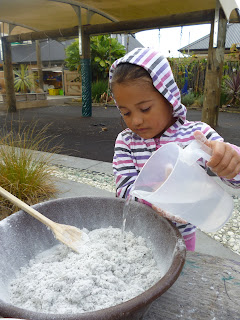When children re-visit their work they become better observers, become more aware of their own thinking processes, develop dispositions of good thinking and become more critical and able to expand their expressive repertoire (Salmon, 2007).
We began these eggs last Thursday using a powdered form of papier-mâché. We had to carefully weigh the power and measure the water - a fantastic way for children to learn about the relevance of maths in real life - for instance measurement, weight, volume and quantity.
Following instructions
Developing ‘process skills’
Soon we were ready to mold the papier-mâché into egg shapes – which was much trickier than it looked – we used our fine motor skills to roll, rub and pinch until we were all happy with our shapes.
The eggs took several days to dry but eventually we were ready to begin our decorating. On the first day of decorating we studied the patterns and designs on several eggs that we have at Kindergarten as well as using some photographs of beautiful Easter Eggs decorated in Europe; we were able to see that the pictures on some of the eggs told stories.
In areas of Europe the decoration of Easter eggs is an important cultural practice, and they are decorated in a variety of ways. Styles vary by region or country and can be decorated in a number of different techniques, including being carved, dyed, painted or appliqued.
Initially we used a single block of colour as a base cover for the eggs.
Focusing
Concentration
Creativity
The next day we were really excited when Lucas and Daniela brought in some very precious eggs which originate from Germany. These were extremely delicate and exquisitely decorated; we took some close up photographs of the eggs and used these as a further provocation for the next layer of our decorating.
 |
| One of Lucas's beautiful eggs |
From the making of the eggs to the final decorating has taken several days and has meant the children have had to be patient (perseverance). I am sure you’ll all agree they look stunning and will make a lovely Easter decorations in the homes of our tamariki and whānau this coming weekend.
Providing children with an opportunity to learn and be a part of the customs, traditions and cultures from around the world.
As Te Whāriki (NZ Early Childhood Curriculum) states, “The languages and symbols of their own and other cultures are promoted and protected…children experience an environment where they experience the stories and symbols of their own and other cultures” (p.72).
Christine Alford













No comments:
Post a Comment